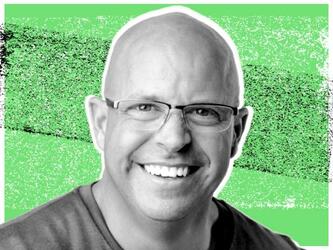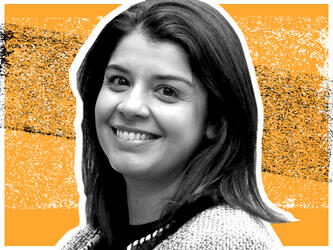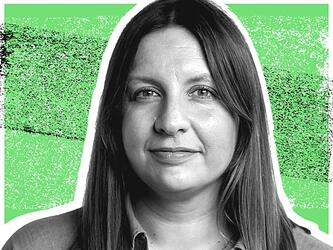Stuck in the middle: Why we need outliers

Switch on the TV on any average evening – watch the news, a soap opera, a comedy, the ad breaks, whatever is on – and don’t you think it’s hard to shake the feeling that we’re living through a global crisis of imagination?
Culture’s on repeat. Politics recycles dead ideas. Music’s deep in the ‘Taylor Swiftification’ of safe stardom. Netflix is mostly quantity over quality. Beauty has one plastic-surgery-approved face. Restaurants? Smash burgers and orange wine on every continent.
The cause of all of this is partly algorithmic. The algorithm pushes content toward the familiar and viral. We get the same songs, memes, headlines, aesthetics, over and over.
More broadly, it feels we’re in a ‘human era of average’ where we’re losing touch with the truly weird, wonderful and wise. I’m seeing it everywhere:
- global coffee shops serving the same matcha lattes in the same minimalist interiors
- fashion cycling micro-trends so fast nothing has time to really evolve and instil standout meaning
- dating apps making love into a commodity
- cities swapping out independent venues for identikit ‘concept’ bars
- social feeds turning niche communities into generic, viral meme farms
- cultural icons under social media scrutiny displaying themselves as safe as possible.
The manifestations go on and on. Wherever you look,you can’t escape this push towards the mediocre.
Why does this matter?
I believe culture moves forward when the outliers – the misfits, the first movers, the ones willing to risk looking wrong – get the mic.
Winston Churchill defied the odds and turned wartime despair into defiance. Aphex Twin ripped up electronic music’s rulebook. Ingvar Kamprad bet Ikea on flat-pack when everyone thought it was cheap and ugly. James Baldwin dismantled racial and sexual taboos with a pen sharper than any sword… and so on.
From politics to pop culture to business to social justice, we need more of those.
The research problem
Market research is dominated by averages, too. The consultancy mindset rules the day. We love frameworks, templates, and ‘playbooks’. We sell the idea that there’s a proven formula for growth, brand-building, or innovation, but in reality, that standardisation has crushed the messy, idiosyncratic experimentation that’s needed for brands to thrive and truly innovate.
We’re experts at selling safety to risk-averse boards. A key part of our business models is de-risking decisions for executives. The pitch is: “If you do this, you’ll be in line with the market.” But that same safety-first mindset prevents companies from backing outsider ideas that could define the next era. What’s rewarded: looking ‘right’ in a boardroom. What’s lost: looking different in the real world.
Many insights and strategy decks treat cultural trends like a buffet: grab what’s ‘hot’ and monetise it quickly, instead of understanding and investing in the people, spaces and time needed to grow something long-term.
We’ve replaced conviction with consensus. As an industry, we excel at workshops, alignment sessions, and stakeholder buy-in – all of which aim to get everyone to agree. But visionary moves often require going against consensus, even making people uncomfortable.
Compounding all of this is our obsession with AI. Enter any research conference and 90% of the talks are about AI. We’re drooling over synthetic audiences that are trained on averages, churning out average stuff.
End result: Market research looks, sounds and acts the same because we’re all following the same templates, and ways of thinking, heading into a strange artificial direction. It raises the question: If we continue like this, going faster, cheaper, being more average, why wouldn’t clients just ask ChatGPT?
I believe our value has to come from something machines can’t replicate: curiosity, lived experience, human connection, a cultural antenna and the ability to see the world from an angle no one else considered. I believe most brands don’t need more data; they need better and alternative thinking. They need the brave thinking (from agency partners) that’s hard to nurture inside the corporate machine, which comes from asking different questions, talking to different people and looking in different places.
What more insight agencies should do
Perhaps this moment – with all the AI drivel and ’average’ thinking flooding the system – is the chance to better our industry and push more insights and brands into braver, more culturally resonant places. That starts with:
- Hiring for difference – not degrees and experience, but people who’ve lived other lives. Get our diversity game together because it’s bad
- Go where the culture is – the club, the street, the Discord server – not only the focus group
- Talk to the edges – the fringes, the marginalised, the unique, the culturally aware… the people/participants that can teach us things we didn’t know already
- Deliver with impact – insights deserve more than a 20-year-old PowerPoint template (if you truly want to change things at least).
The future won’t be built by the averages. It’ll be built by the outliers. Our job is to find them, back them, and make sure their voices cut through all the mediocre noise.

We hope you enjoyed this article.
Research Live is published by MRS.
The Market Research Society (MRS) exists to promote and protect the research sector, showcasing how research delivers impact for businesses and government.
Members of MRS enjoy many benefits including tailoured policy guidance, discounts on training and conferences, and access to member-only content.
For example, there's an archive of winning case studies from over a decade of MRS Awards.
Find out more about the benefits of joining MRS here.












1 Comment
Andy Drake
6 hours ago | 1 like
Really like the article Joey, well said. The crux for me is where you said 'curiosity, lived experience, human connection, a cultural antenna and the ability to see the world from an angle no one else considered'. The only angle I differ is I think AI and tech can ironically be really good to humanise research. Been doing that and it's been really uplifting to have real conversations with real people. I love the idea of doing that on the fringes - makes perfect sense to me.
Like Reply Report